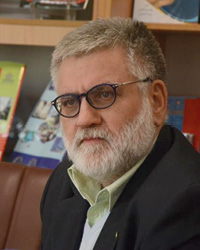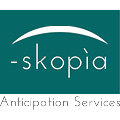Simona Sorrentino interviews Roberto Poli
-skopìa is a multiservice University of Trento startup that was established in November 2015. We talked about it with Professor Roberto Poli, Unesco Chair in Anticipatory Systems, member of the Department of Sociology and Social Research, and president of the company.
Professor Poli, can you explain what ‘anticipation’ means?
Anticipation is an innovative version of strategic thinking that comes from the need to deal with the ever-increasing complexity and speed of social change. These changes make systems more vulnerable and more interdependent, and therefore more at risk of collapse through the domino effect.  Reacting to a crisis that is already underway severely limits the possibilities for action. An approach using anticipation identifies and deals with risks before they become unmanageable, developing decision-making strategies that are more flexible, more aware and more adaptive, and thus building more robust systems. Anticipation is the third and highest level of futures studies, after forecast (prediction based on trends) e foresight (the elaboration of scenarios). Professionally, the anticipator translates scenarios of possible futures into strategies, and creates the conditions to increase the variety of actions that can be taken. The anticipator also helps clients to think critically about which futures they consider desirable, and assists decision-makers in defining the directions to take.
Reacting to a crisis that is already underway severely limits the possibilities for action. An approach using anticipation identifies and deals with risks before they become unmanageable, developing decision-making strategies that are more flexible, more aware and more adaptive, and thus building more robust systems. Anticipation is the third and highest level of futures studies, after forecast (prediction based on trends) e foresight (the elaboration of scenarios). Professionally, the anticipator translates scenarios of possible futures into strategies, and creates the conditions to increase the variety of actions that can be taken. The anticipator also helps clients to think critically about which futures they consider desirable, and assists decision-makers in defining the directions to take.
The team at -skopìa is strongly interdisciplinary. What is the global vision that makes your company innovative?
At present, -skopìa is the only Italian company doing research, consultancy and training in the area of futures studies and anticipatory management of risk and opportunities. It’s a demanding vocation, that rests on three pillars: having the necessary disciplinary skills (from financial mathematics to organizational management), knowledge of the markets (insurance, environment, health, and education), and the application of the methods developed in futures studies over the last 60 years. The way we operate unites these components in a systemic vision that transcends disciplinary boundaries. To understand the direction the world might go in, it is essential to analyze the structures underlying phenomena and to integrate a lot of different information.
What services does -skopìa offer and which markets are you aiming at?
We specialize in applied research for companies and public administration; consultancy on strategic intelligence and analysis of changes, risks and opportunities; and the development of skills based on an anticipation perspective. The markets in which we operate in Italy are insurance, education, environmental and geopolitical risk, health and ageing.
What contribution can anticipation provide for the health sector?
The ageing of the population is one problem that many countries will have to face in the near future. In 2050 a third of the European population will be over 65. Italy and Germany (as well as Japan) will be the first countries to have to really deal with this problem. To give just one example, as the age of the population increases, so does the number of people with chronic health problems, with a consequent increase in the costs for the Italian National Health Service. -skopìa is working on finding win-win solutions that don’t leave the weakest to pay the consequences. The main point is to find solutions that are set in a future-oriented framework. Proposed solutions for individual sectors, dealing with just one aspect of the problem at a time (financial sustainability, reorganization of services etc.) don’t go to the root of the problems and often end up making the problem worse for later generations. So it is essential to also identify and use other resources. The revitalization of the community will play a role, and we should re-think the role of solidarity networks and of cooperation. Partly this means adopting an approach of social experimentation, and partly it means creating the conditions for people to develop relationships in which they trust and look after each other.

For schools we have a program called ‘Anticipating changes’, which consists of four modules aimed at school principals, teachers and their classes: Exploring personal futures (introduction to the future labs in class: “the future in schools”); Exploring institutional futures (analyzing the changes in education and training and the possible futures of the education system: “the future of schools”); Introduction to the study of the future (principles, history and techniques of future studies); Teaching experiments (protocols, meetings and other forms of support for teachers and classes). We have already run several courses, including one for Iprase (the Provincial Institute of Educational Research and Experimentation), and others are being organized.
Within the education system, as I mentioned. For other markets we have some initial collaborations with businesses, insurance companies, hospitals and local administrations, both in the province and elsewhere. We are also establishing our first international collaborations, not just in Europe. Some of these projects will happen as part of funded research. Others will be actual consultancy undertaken for companies or public administration. In both cases we develop models and solutions that can, at least partly, be replicated.




